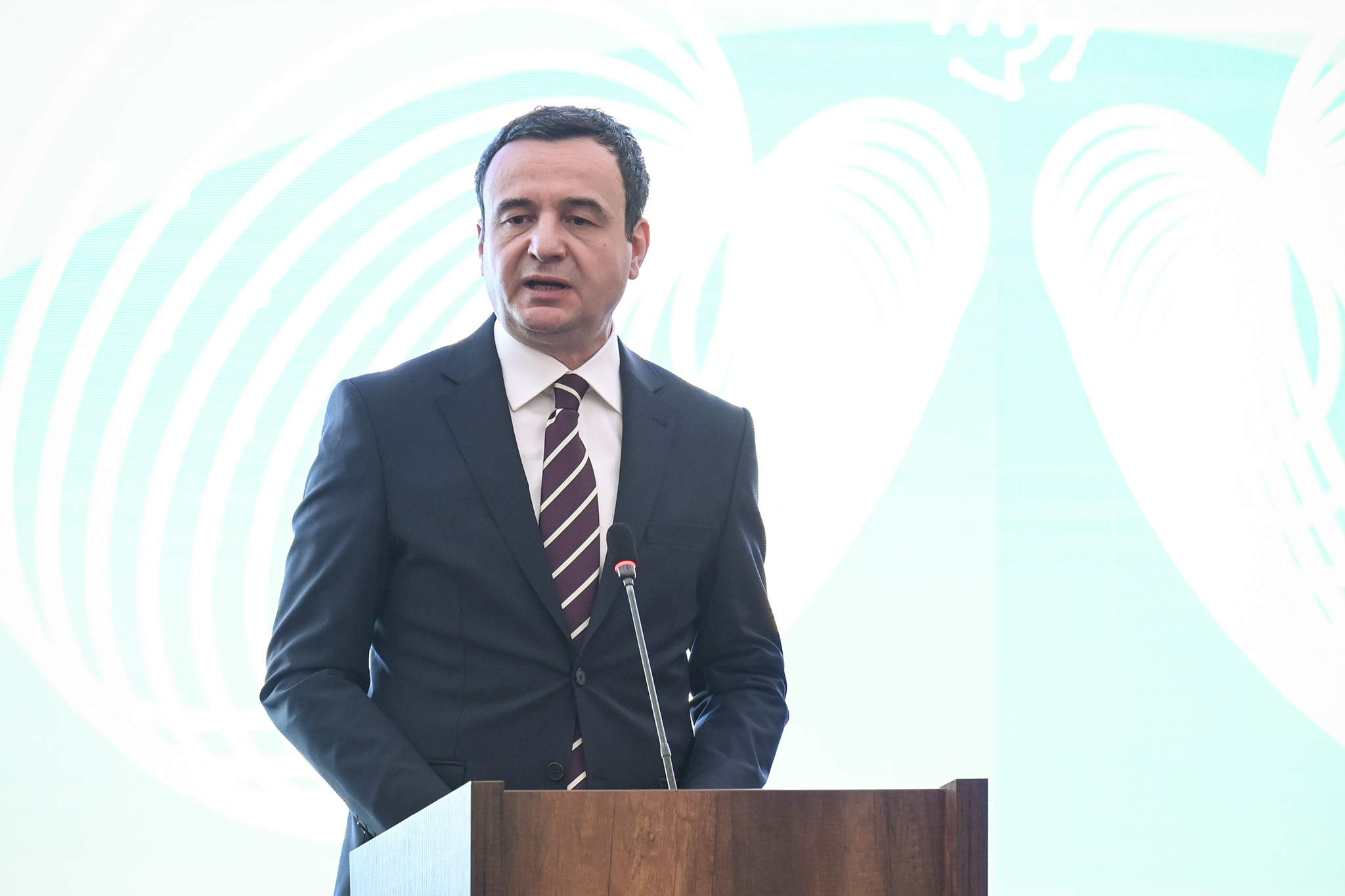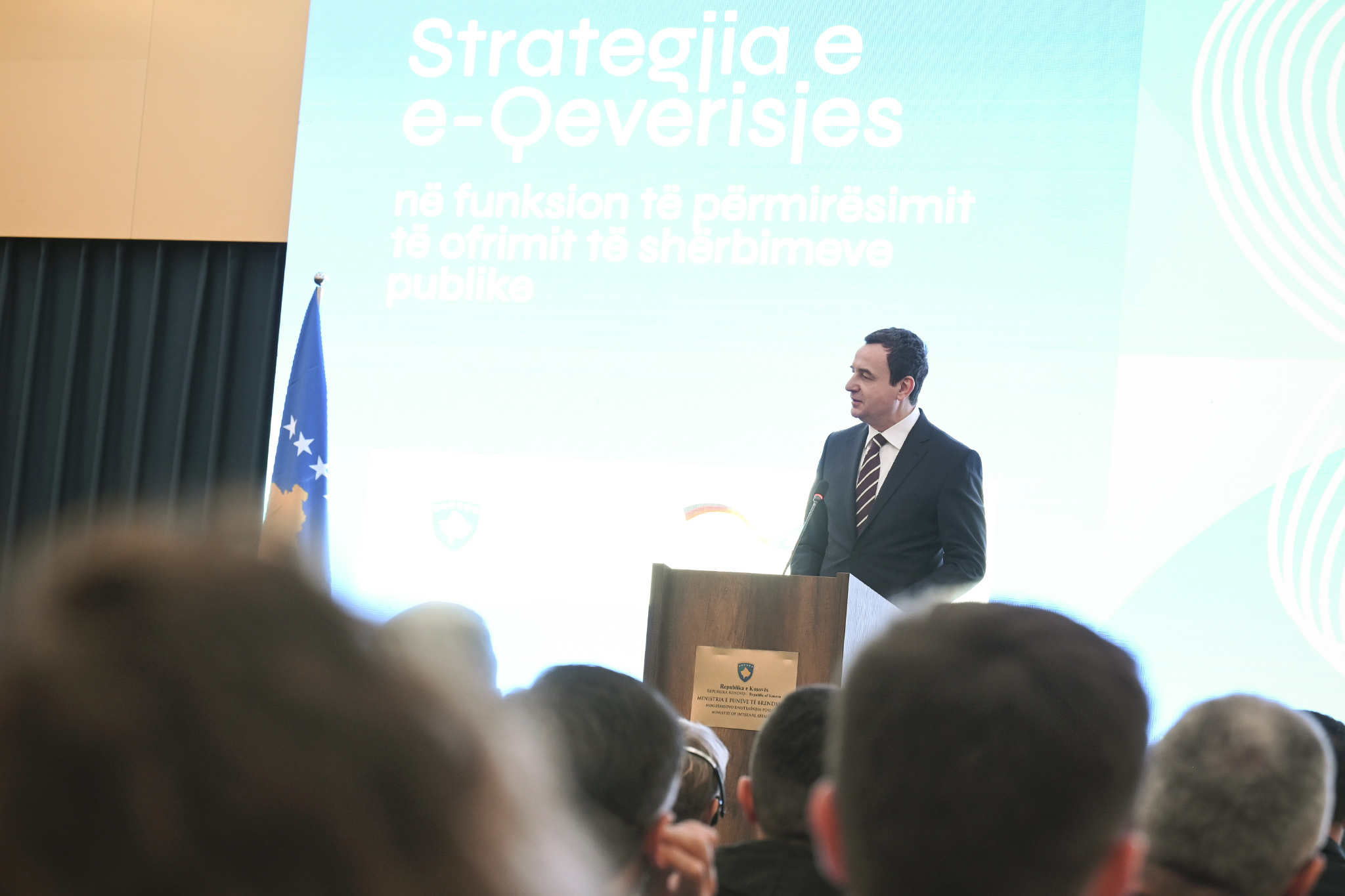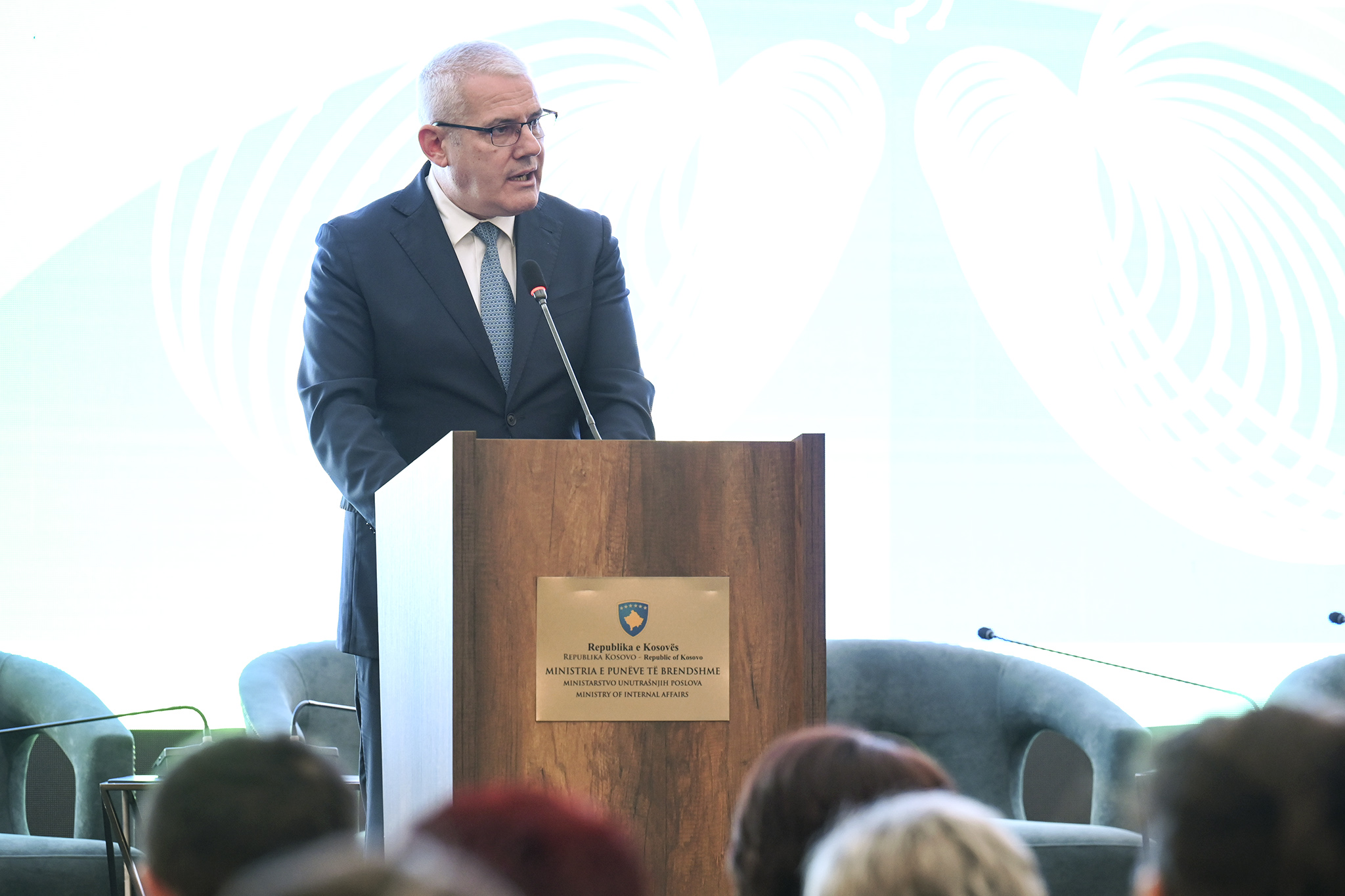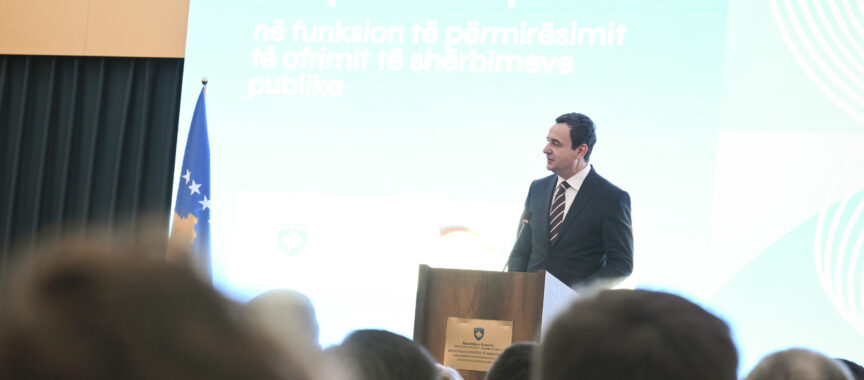Pristina, April 6, 2023
The Prime Minister of the Republic of Kosovo, Albin Kurti, was one of the main speakers at the Conference on E-Government Strategy, which aims to improve the provision of public services, organized today by the Ministry of Internal Affairs.
In his address, he said the new E-Government Strategy 2023-2027 that we are presenting today, sets our vision for a digitized public administration that affects the well-being of citizens; maximizes the effectiveness, transparency and accountability of governance; and sustainable economic growth of the country.
Furthermore, he said that the Strategy foresees substantive reforms, which are based on the key principles of the European Commission for the digitalization of services, and which aim, as he said, to transform the way citizens interact with the public administration.
According to the Technology Maturity Index of the World Bank, we have risen from group C to group B, for the focus on digital governance and the eKosova platform has over 770 thousand users, we already have over 130 electronic services.
Speaking about the principles of this strategy, Prime Minister Kurti emphasized the fact that one of the pillars is the digital systems and infrastructure of the country. The strategy envisages the construction of the comprehensive architecture of organizations, infrastructure, systems, data and interaction, which will enable the sustainable development of digitization in the government, and as we have already covered 100% of inhabited areas with broadband internet. As a result, Kosovo is in the top 7 countries in Europe and is compared to Switzerland and Luxembourg, the prime minister highlighted.
He emphasized that the Strategy also foresees the piloting of integrated service centers, which will offer the concept of one-stop-shop, for receiving many services in a single location.
And while we are moving towards an increasingly digital future, Prime Minister Kurti also underlined the danger from cyber threats and attacks. For this reason, he said that the increase in security and cyber stability of government digital systems and infrastructure is another important pillar of the strategy.
Of course, the most challenging part of any strategy is its implementation, he said, therefore he was happy that some of our development partners have already shown their willingness to support the implementation of this strategy and action plan. Meanwhile, he also invited other development partners for cooperation and support in the implementation of this strategy, which, in addition to providing and improving services for citizens and businesses, can also help in promoting growth and economic development, attracting foreign investments and creating of new countries.
In the end, Prime Minister Kurti thanked the Estonian e-Governance Academy (eGA) for their cooperation in the design of this strategy, and GIZ for their support in the realization of this cooperation.
The complete speech of the Prime Minister of the Republic of Kosovo, Albin Kurti:
The Honorable Minister of Internal Affairs, Mr. Xelal Sveçla,
The Honorable Minister of Local Government Administration, Mr. Elbert Krasniqi,
His Excellency Ambassador of Germany in Kosovo, Jörn Rohde,
Honorable head of UNDP, Mrs. Maria Suokko,
Dear Minister of Industry, Entrepreneurship and Trade, Mrs. Rozeta Hajdari,
Honorable Deputy Minister of the Interior, Bardhyl Dobra,
Dear members of the Assembly of Kosovo, mayors of the municipalities of the Republic,
Dear representatives and development partners,
Dear representatives from the academic community, businesses, and civil society,
Dear attendees, ladies and gentlemen,
Today we are marking an important moment in our digital transformation journey. The new E-Government Strategy 2023-2027, which we are presenting, sets our vision for a digitized public administration that affects the well-being of citizens. It also maximizes the effectiveness, transparency and accountability of governance; as well as positively affects the sustainable economic growth of the country. This vision matches the expectations of our citizens for digitalization. In the study conducted by the organization GLPS, 73.9% of citizens estimate that the digitization of government services would make it easier to access and receive the services offered by public institutions, while 74.4% of them think that the digitization of services leads to a better governance efficient and more effective.
The strategy foresees substantive reforms, based on the key principles of the European Commission for digitalization of services, which aim to transform the way citizens interact with public administration. One of these principles is that of placing the citizen at the center. This means designing and providing services that are based on the needs of the citizen, eliminate bureaucracy, and enable access from anywhere and anytime, and save his or her time. One of the implementations of this principle that the strategy foresees is through the concept of services based on life events. The provision of proactive, personalized and automated services, based on life events, represents a paradigm shift in the functioning of the public administration in relation to the citizen.
Another important principle is that of inclusiveness. On March 21, in Herticë, we marked the connection of the last village to broadband internet. In our societal journey towards digitalization it is important that no one is left behind. We have already covered 100% of residential areas with broadband internet. Kosovo is in the top 7 countries in Europe and is compared with Switzerland and Luxembourg. However, we must ensure that the benefits of digitization and interoperability of systems are enjoyed by all citizens, including those who use the digital access channel.
Therefore, the strategy also foresees the piloting of integrated service centers, which will offer the one-stop-shop concept, for receiving many services in a single location.
The implementation of the strategy’s vision and principles relies on several key pillars, which have been defined as its strategic objectives. One of these pillars, however, is the country’s digital systems and infrastructure. The strategy envisages the construction of the comprehensive architecture of organizations, infrastructure, systems, data and interaction, which will enable the sustainable development of digitization in the government. The advancement and strengthening of central systems such as the interaction platform, and the main portal for the exposure of services – eKosova, are some of the key interventions foreseen to enable the digitization of services. On this platform with over 770 thousand users, we already have over 130 electronic services.
According to the World Bank’s Technology Maturity Index, we have risen from group C to group B, for the focus on digital governance. And while we are moving towards an increasingly digital future, the risk from cyber threats and attacks inevitably increases. Therefore, the increase in security and cyber sustainability of government digital systems and infrastructure is another important pillar of the strategy.
However, the main factor that determines the success of this strategy is people. Because this is what people do for people. This includes Information and Communication Technology professionals who will enable the development, administration and maintenance of digital systems, but also all civil servants in our administration who will use digital technology in their daily work. The government is committed to creating the preconditions for this. 1500 young people have been trained in digital skills. This strategy attaches special importance to the creation of frameworks for continuous development of digital skills in the public sector.
One of the elements of the digital transformation is the inter-institutional coordination and the government-wide approach to digitalization. Therefore, another key pillar of the strategy is precisely the creation and strengthening of central mechanisms for the coordination and supervision of digitization in the government. It foresees the measures for the strengthening of AŠI, as the agency responsible for the implementation of the central components of digital governance, but also the creation of supervisory and coordinating bodies of digital transformation within the Prime Minister’s Office. We have already established the Commission for Digital Transformation, which he led, and which has the role of supervision and strategic direction of digitalization.
We have also created coordinating roles and bodies, such as: the unit for digital transformation, as well as the chief coordinator and the technical committee for digital transformation. These will enable a whole-of-government and coordinated approach to digitization in all government sectors.
For a successful implementation of the digital transformation, it is necessary to continuously follow the contemporary trends in the development of information technology. Therefore, innovation in e-Government has been defined as one of the pillars of our strategy. The strategy foresees the initiation of projects and the creation of innovation cells within the public sector to test and pilot new technologies such as artificial intelligence, big data, machine learning, and blockchain. These projects and initiatives will provide additional opportunities for collaboration with the private sector and academia, at the national and international level. This will be one of the ways that our e-governance strategy will also be able to help promote economic growth and development. But this is not the only aspect of the strategy’s direct impact on the economy. It will enable businesses to access more electronic government services, facilitate obtaining permits and licenses, thus reducing the time and cost of doing business. And all of these can help attract investment, create new jobs and boost economic growth.
Of course, the most challenging part of any strategy is its implementation. We are happy that some of our development partners have already expressed their willingness to support the implementation of this strategy and action plan. I use the opportunity to invite other development partners for cooperation and support in the implementation of this important strategy for our country.
In the end, I want to thank the Estonian e-Government Academy (eGA) for their cooperation in the design of this strategy, as well as GIZ for their support in the realization of this cooperation.
Thank you!
Last modified: April 6, 2023








